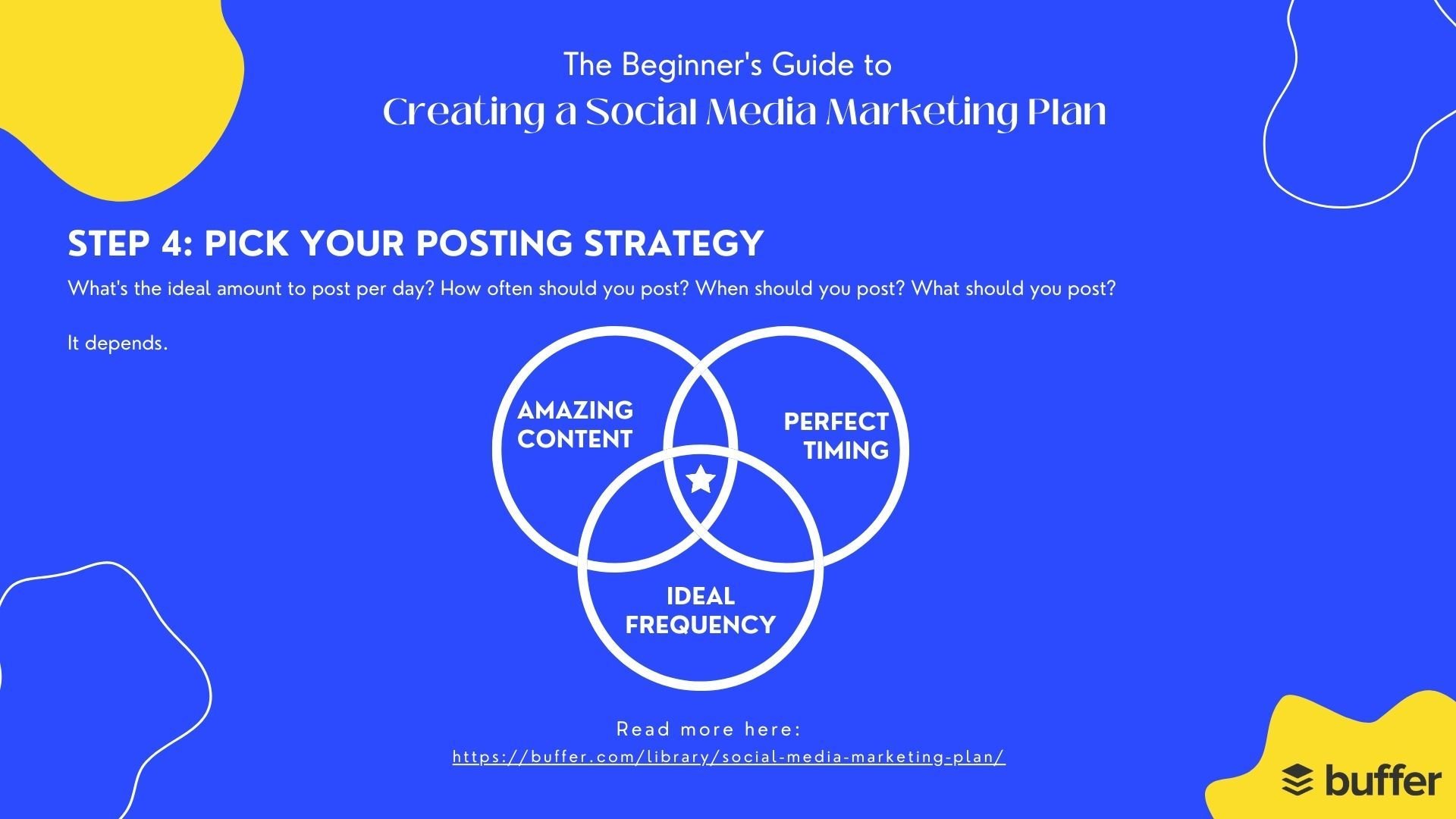
Introduction
In today's digital age, social media has become anintegral tony successful marketing strategy. But how do you navigate through the vast landscape of social media platforms and effectively reach your target audience? The answer lies in creating a well-defined social media marketing strategy.
Why a social media marketing strategy is important
Every business needs a social media marketing strategy to establish a strong online presence and gain loyal customers. Here's why:
- Targeted Approach: With millions of users on various social media platforms, a strategy helps you identify and target your ideal audience. This ensures that you reach the right people with your message and maximise your marketing efforts.
- Consistency: A well-defined strategy helps you maintain a consistent brand voice and image across different social media channels. This consistency builds trust with your audience and establishes your brand as reliable and reputable.
Benefits of having a well-defined strategy
- Increased Brand Awareness: A social media marketing strategy allows you to effectively promote your brand, products, and services to a wider audience. You can increase brand visibility and attract new followers by consistently sharing relevant and engaging content.
- Better Engagement: When you have a clear strategy in place, you can create content that resonates with your audience and encourages them to engage with your brand. This includes likes, comments, shares, and ultimately, conversions.
- Measurable Results: By setting specific goals and key performance indicators (KPIs), you can track the success of your social media marketing efforts. This data-driven approach allows you to make informed decisions and optimize your strategy for better results.
A clear social media marketing strategy is important for businesses that want to use social media to increase brand awareness, engagement, and business growth.
:max_bytes(150000):strip_icc()/Term-Definitions_Target-market-49a03b58f6d54ddd88d46521f248fc8a.jpg)
Setting Your Goals
When it comes to social media marketing strategies, setting clear goals is essential. Without them, measuring your success or making informed decisions is challenging. Here are two key points to consider:
Identifying your target audience and objectives
Before diving into social media marketing, it's crucial to identify your target audience and objectives. Ask yourself: Who are you trying to reach? What are your goals? Are you looking to increase brand awareness, drive website traffic, generate leads, or boost sales? Understanding your target audience and goals will help you tailor your content and strategy more effectively.
Choosing the right social media platforms
To choose the right social media platforms, consider your goals and where your target audience is most active. Each platform has its unique features and demographics. For example, if you target millennials and Gen Z, platforms like Instagram and TikTok may be more effective. If you want to reach professionals and B2B clients, LinkedIn might be a better option. Do some research to understand the strengths of each platform and how they align with your goals.
To create an effective marketing strategy, set clear goals, identify your target audience, and choose the appropriate social media platforms. This will ensure you reach the right people and achieve your marketing objectives.

Content Creation and Curation
Developing a content strategy
Creating a social media marketing strategy begins with developing a content strategy. Identify your target audience, understand their needs and interests, and find ways to provide value through your brand. It's important to align your content strategy with your business goals and objectives. This will help you create content that resonates with your audience and supports your brand messaging.
Creating engaging and shareable content
To effectively engage your audience on social media, you need to create valuable and shareable content. Valuable content provides information, entertainment, or inspiration to your audience. It should be relevant, well-written, and visually appealing. Shareable content is content that people want to share with their networks. This could include informative articles, entertaining videos, compelling visuals, or engaging quizzes. By creating content that people want to share, you can increase your brand's reach and visibility.
In addition to creating original content, you can curate content from other relevant sources to your audience. This can position your brand as a trusted source of information and provide additional value to your audience. When curating content, remember to give credit and add your own insights to enhance the curated content.

Engaging with Your Audience
Building relationships through social media interactions
Social media has become an integral part of successful marketing strategy in today's digital world. One key aspect of social media marketing is engaging with your audience. By actively interacting with your followers, you can build meaningful relationships that foster loyalty and enhance your brand's reputation.
To effectively engage with your audience, create relevant and compelling content that resonates with your target market. Promote your products or services and respond to followers' comments, messages, and mentions to provide value to your audience. You can establish your brand as a reliable source of information and entertainment by offering useful tips, insights, or entertaining content.
Furthermore, make an effort to respond to comments, messages, and mentions from your followers. Show genuine interest in their opinions, concerns, and questions. Listening and responding to your audience will strengthen your relationships with current customers and attract new ones. People appreciate brands that do this.
Responding to comments and messages
Promptness, professionalism, and empathy are key when responding to comments and messages on social media. Aim to reply as soon as possible to show that you value your audience's feedback. Your responses should be concise, and gracefully respectful, and provide helpful solutions whenever applicable.
Additionally, don't shy away from addressing negative comments or complaints. Instead, use these opportunities to showcase your excellent customer service skills. Respond calmly, seek to understand the issue, and offer a resolution. By handling such situations with grace, you can turn a dissatisfied customer into a loyal advocate for your brand.
Remember, engaging with your audience on social media is an ongoing process. Regularly monitor your social media channels, participate in relevant conversations, and adapt your strategy based on the feedback received. Doing so can effectively build a strong and engaged online community that supports your brand's growth.

Monitoring and Analytics
Tracking your social media performance
One of the most crucial aspects of a successful social media marketing strategy is monitoring and tracking your performance. By keep closely monitoringr social media metrics, you can identify what's working and what needs improvement.
There are several key performance indicators (KPIs) that you can track, including engagement rate, reach, impressions, clicks, and conversions. By analyAnalyzing these metrics lets yousights into your audience's behavior, preferences, and response to your content.
Using analytics to optimize your strategy
Once you have gathered data on your social media performance, it's time to use analytics tools to optimize your strategy. By analyzing the data, you can identify patterns, trends, and areas for improvement.
Here are a few ways to optimize your social media marketing strategy using analytics:
- Identify high-performing content: Analyze which content types resonate with your audience and generate the most engagement. Use this information to create more of that content to keep your audience interested and engaged.
- Optimize posting times: Analyze when your audience is most active and engaged on social media. Schedule your posts for those peak times to ensure maximum visibility and engagement.
- Test and iterate: Use A/B testing to experiment with different content formats, headlines, visuals, and calls-to-action. Analyze the results to determine what works best for your audience and refine your strategy accordingly.
By continuously monitoring and analyzing your social media performance, you can optimize your strategy and achieve better results, ultimately driving more traffic, engagement, and conversions for your business.

Paid Advertising and Influencer Marketing
Leveraging paid advertising options
When it comes to social media marketing strategy, paid advertising is a powerful tool to increase your brand's visibility and reach. Platforms like Facebook, Instagram, and Twitter offer robust advertising options that allow you to target specific demographics and maximize your return on investment. By utilizing paid ads, you can ensure that your content is seen by the right audience, increasing the chances of conversion and engagement.
Some key benefits of paid advertising include:
- Targeted reach: Paid advertising allows you to define your target audience based on demographics, interests, and behaviors. By being specific, your ads are shown to users who are most likely to be interested in your products or services.
- Increased visibility: With organic reach on social media platforms becoming increasingly challenging, paid advertising offers a solution to cut through the noise and get your content in front of a larger audience. This increased visibility helps you to build brand awareness and drive traffic to your website or landing page.
Collaborating with influencers to expand reach
Influencer marketing is another effective strategy to consider in your social media marketing plan. Collaborating with influencers can help you tap into their established audiences and expand your reach. Partnering with influencers who share your brand values and target audience can help you use their credibility and authority to promote your products or services.
Here are some benefits of influencer marketing:
- Authenticity: Influencers have built trust and credibility with their followers. When they endorse your brand, it comes across as a genuine recommendation, leading to higher engagement and conversion rates.
- Targeted audience: Influencers have a dedicated following that matches your target market. Partnering with the right influencers in your industry helps you reach your target audience and boost brand visibility with potential customers.
In summary, paid advertising and influencer marketing are valuable strategies to include in your social media marketing plan. Social media platforms offer targeted reach, increased visibility, and the opportunity to tap into existing audiences to expand your brand's reach and drive conversions.

Measuring Success and Adjusting Your Strategy
Key metrics to monitor
To be successful in social media marketing, you must monitor important metrics and analyze the data.Some important metrics to track include:
- Engagement rate: Measure the level of interaction your content generates, including likes, comments, and shares. This indicates how well your audience is engaging with your brand.
- Reach: Monitor the number of unique users who see your content. This metric helps you understand the size of your audience and how effectively you are reaching them.
- Conversion rate: Track the number of conversions, such as purchases or sign-ups, resulting from your social media efforts. This metric directly measures the effectiveness of your strategy in driving desired actions.
Making data-driven decisions to improve your strategy
Analyzing the data collected from your social media metrics allows you to make data-driven decisions to improve your strategy. Here's how:
- Identify trends: Look for patterns and trends works well andin your data to identify what is working well and what needs improvement. Adjust your strategy accordingly.
- Experiment and test: Use A/B testing to compare different elements of your strategy, such as ad copy or visuals, and measure their impact on key metrics. This helps you refine your approach and optimize performance.
- Listen to your audience: Pay attention to feedback and comments from your audience. This valuable insight can guide you in making changes that meet their needs and preferences.
Regularly monitoring metrics and using data to guide decisions allows for continuous improvement of your social media marketing strategy, resulting in maximum impact and success.

Case Studies
Successful social media marketing strategies from businesses
Implementing an effective social media marketing strategy can significantly impact your brand's visibility, engagement, and ultimately, its success. Here are some successful case studies from businesses that have utilized social media marketing to their advantage:
- Wendy's: Leveraging humor and engaging with followers – Wendy's, the fast-food chain, gained attention and follower loyalty by using witty and humorous content on their social media platforms. Their clever and often sarcastic tweets generated significant engagement, resulting in increased brand awareness and customer loyalty.
- Dollar Shave Club: Creating shareable content – Dollar Shave Club used creative and shareable video content to build a strong social media presence. Their viral video campaign showcased their product benefits while entertaining and engaging their target audience. This strategy helped the company gain millions of views, driving brand awareness and customer acquisition.
Real-life examples and lessons learned
These case studies provide valuable lessons on how to create a successful social media marketing strategy:
- Know your audience: Understanding your target audience's preferences, values, and interests is crucial for creating relevant and engaging content.
- Be authentic and consistent: Building a strong brand identity requires authenticity and consistency across all social media channels. Stay true to your brand's values and maintain a consistent tone and visual style.
- Create shareable content: Developing content that is entertaining, informative, or valuable can greatly increase your brand's reach and engagement.
- Engage with your audience: Actively responding to comments, messages, and inquiries shows your audience that you value their feedback and builds a stronger connection with your customers.
By iIncorporating these strategies and lessons into your social media marketing plan elevate your brand's online presence and drive tangible results.

Conclusion
Creating a strategic social media marketing plan is essential for businesses looking to leverage the power of social media platforms. It allows organizations to engage with their target audience effectively, build brand recognition, drive website traffic, and ultimately increase conversions and sales. Businesses can establish a strong base for their social media marketing by following the steps in this article. It will help them achieve their goals.
Summarizing the importance of a social media marketing strategy
A social media marketing strategy helps businesses in several ways:
- Targeted Marketing: By identifying target audience demographics, interests, and behaviors, businesses can tailor their content to resonate with their ideal customers.
- Brand Awareness and Recognition: A well-executed social media strategy can increase brand visibility and recognition, helping businesses stand out among competitors.
- Engagement and Relationship Building: Social media platforms allow businesses to directly engage with their audience, build relationships, and foster customer loyalty.
- Website Traffic: Using social media channels to direct traffic to your website can boost online visibility and generate leads.
Key takeaways and final thoughts
Creating a social media marketing strategy requires careful planning and consideration. Businesses should:
- Set clear goals and objectives.
- Identify and understand their target audience.
- Choose the right social media platforms.
- Create and share high-quality and engaging content.
- Monitor and analyze results to optimize future efforts.
By following these steps and consistently evaluating their strategy, businesses can maximize the effectiveness of their social media marketing and achieve long-term success.




